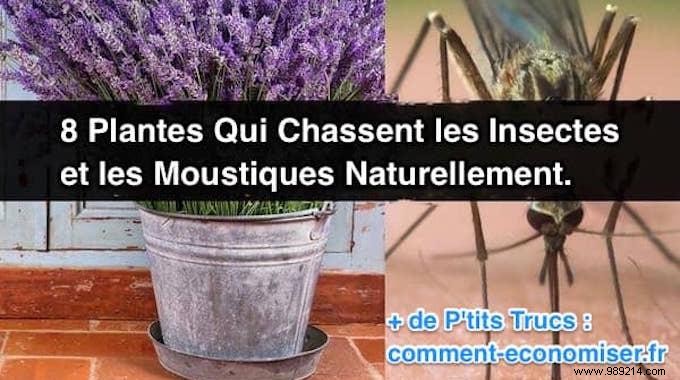
Mosquitoes, flies, insects... They can quickly ruin our lives !
Wondering how to hunt them to enjoy your summer evenings?
No need to use insecticides full of harmful chemicals.
Did you know that there are plants that keep these critters away naturally?

It's still more pleasant, more beautiful (and less dangerous) than mosquito repellent sprays, isn't it?
Discover now these 8 plants that hunt insects and mosquitoes:

The citronella candles that you burn on your terrace are made with the oil of this plant. "Lemongrass is by far the most well-known plant for repelling mosquitoes," says gardening expert Carmen Johnston. "Its scent is a bit pungent. I often put it in a small terracotta pot about 20 cm in the middle of the table when we spend time outside. You can also use small lemongrass plants in a composition or use the plant itself as a centerpiece".

This perennial or perennial plant is sometimes nicknamed "the natural insecticide" because it can hunt aphids, tomato horn, beetles, leafhoppers and chinch bugs. “Growing petunias is very simple. You can plant them in the ground or leave them in pots,” explains Peyton Lambton, specialist journalist. "They like the sun. I recommend buying seedlings and placing them in light, well-drained soil in full sun after the last spring frosts."

"The scent of lavender repels mosquitoes," says Carmen Johnston. "I planted it in beds at the entrance to my garden. I love its blue flowers. Lavender likes heat and drought. It's perfect for summer!" You can also apply lavender oil directly to your skin as a natural repellent.

Nasturtiums repel whiteflies, bedbugs, aphids, several types of beetles, and cabbage fleas. They will also promote the growth of other plants. "They produce a chemical that stays airborne and repels insects. That way they not only protect themselves, but they also protect other plants," says professional landscaper Chris Lambton. "Plant them in early spring in moist, well-drained, sunny soil. They should be watered regularly. Dead heads should be regularly removed to encourage flowering."

Not only does rosemary add flavor to your dishes, but it also helps repel insects. "It's another perfect plant for summer because it loves drought," says Carmen Johnston. "It's one of my favorite smells, but mosquitoes can't stand it. You can grow rosemary in pots but you can also plant it in your garden, for hedges." According to Carmen Johnston, this plant also brings cachet to floral arrangements. So why not plant it outside to repel insects and to please the eyes?

Basil is a plant that does not live for more than a year. It also repels flies and mosquitoes. For it to thrive, you need to make sure it gets 6-8 hours of sunlight a day. The soil in which it is planted should be moist and well drained. When you see little flowers starting to form, pinch them off. The leaves will keep all their flavor. This versatile plant can also relieve mosquito bites. For this, crumple a few basil leaves in your hands to release its natural oils. Then rub them against the mosquito bite to stop the itch.

Lemongrass is also simply called lemongrass or lemongrass verbena. It is a plant very close to lemon balm (Melissa officinalis L. ), which we saw in issue 1. Like lemon balm, it repels mosquitoes. But unlike her, she is edible. It is also very often used in Southeast Asian cuisine. Lemongrass can reach 1 meter or even 1 meter and a half high. It takes up a lot of space in the garden. It therefore needs to be planted in a large planter or a large pot. Put it in a sunny place, because it does not support temperatures below 10°.

Mint is a plant with refreshing flavors. It can enhance your dishes and your cocktails. But that's not all. "It's also a so-called perennial plant that repels mosquitoes," says Peyton Lambton. "Mint is easy to grow in a garden. Besides, it can be difficult to contain. That's why it's best to plant it in a pot. To keep it in top form, take leaves regularly. During the winter you can grow it in the house. That way it will also chase away flies!"